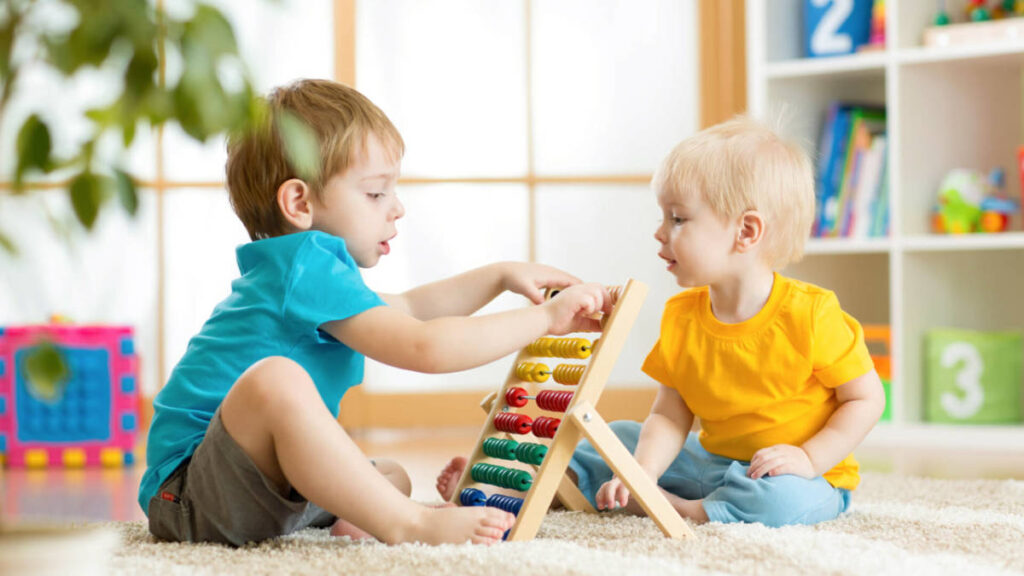When do kids start counting? Did you know that your little ones can start learning math from a very young age? We’re talking about basic counting that can set them up for future success. Introducing early math skills to your child, you’re helping them understand the world in a whole new way. Plus, these basic math skills can give them a foundation for academic success that will last throughout their school years! So, don’t wait – start teaching those numbers and counting today!

Math may not be the most exciting subject, but it’s never too early to start introducing your little one to the world of numbers. In this blog, we’ll show you how to make math fun and engaging for your child, even at a young age. Buckle up, it’s time to count our way to early math success!
Why teaching early math skills to your little one is important?
Looking to give your little one an edge in math? Start teaching them those numbers ASAP! A solid foundation from an early age can lead to a brighter future filled with problem-solving and confidence. Plus, imagine the satisfaction of watching your child proudly count to 100 (or higher!) – now that’s a milestone worth celebrating!
The way the brain develops to learn math skills
If you want to have a superpower, forget about flying or invisibility – master math instead! Math can open doors in every aspect of life, from calculating a bill to plotting a road trip. Not to mention, math skills are pretty much baked into our brains. First you learn to count, then you gradually start connecting numbers with things and making calculations. Eventually, you can use your problem-solving skills to tackle even the most daunting of equations, and before you know it, you’re a math wizard! Soon enough, you’ll be using your math skills to navigate the world like a pro. So why not join the math whiz club and see where those numbers take you?
When Do Kids Start Counting?
Get ready for your daily dose of cuteness because we’re talking about when little ones start flexing their counting skills! Around 18 months is when most kiddos start to grasp the concept of counting and may even be able to recite a few numbers. Don’t be surprised if you hear a little voice chanting “one, two, three” while they play, but hey, everyone’s gotta start somewhere! Some babies might even come out of the womb counting, but for the majority, the counting adventure begins around the 1.5-year mark. So, get your abacus ready and get ready to witness some seriously adorable early math skills!
What age range is typical for a child to start counting
Ah, the age-old question of when kids start counting. Well, buckle up because we’ve got the answer! The average child starts counting around 2 years old, but don’t expect them to recite the Fibonacci sequence just yet. They might be able to count up to 10 but don’t count on them telling you what exactly that number is. It’s all part of the learning process, folks. Now you know, that knowledge is power!
The milestones of counting development
Let’s start with the basics of counting – development, that is! It all begins with baselines – a snapshot of a child’s development at a specific point in time. Think of it like a developer’s blueprint for a building. Once those are established, it’s time to hit those milestones! Think of these as important markers that help us track a child’s progress over time. And just like how we need to check our GPS on a road trip, milestones can help identify areas where a child needs a little extra support.
Let’s break it down, folks! Developmental milestones come in three flavors: basic skills, social and emotional growth, and physical development. We’re talking walking, talking, chowing down, making connections, handling emotions like a champ, and feeling ourselves grow taller (and mightier). So whether you’re conquering the crawling stage or finally able to order off the grown-up menu, take a moment to celebrate your milestones because you’re crushing it!
How to Introduce Early Math Skills
Looking to build your little one’s future math skills? Don’t worry, we’ve got you covered! Although math may seem a bit daunting, it’s an essential skill that children must develop to become successful problem-solvers later in life. Here are some fun-loving tips that will make math an exciting challenge for your young ones!

Start with simple concepts.
Give your little ones an academic advantage by following this simple, yet effective approach. Kick off their math journey by starting with easy peasy concepts that will stick with them like glue. Start with the ABC’s of math: addition and subtraction. As they master the basics, up the ante with more complex concepts like decimals, fractions, and whole numbers. #MathGeniusInTheMaking
Make math fun
Boring math lessons, be gone! The key to unlocking your child’s inner math wizard is to make it fun. So why not play some engaging math games or even make some math crafts together? Who knew math could be so darn delightful?

Model the behavior you want your kids to imitate.
Are you tired of your kids struggling with math? Fear not, dear parent! The secret to success is modeling the behavior you want to see. Get those problem-solving skills in tip-top shape because your little ones are watching and imitating. And let’s be real, who wouldn’t want to be a math whiz? Show them how it’s done and watch them excel. You’ve got this!
Benefits for Kids Who Learn Early Math Skills
Are you tired of your kids struggling with math? Fear not, dear parent! The secret to success is modeling the behavior you want to see. Get those problem-solving skills in tip-top shape because your little ones are watching and imitating. And let’s be real, who wouldn’t want to be a math whiz? Show them how it’s done and watch them excel. You’ve got this!
How learning early math skills can help with problem-solving
The key to overcoming life’s roadblocks is through problem-solving, and what better way to build that skill set than by mastering math early on? By becoming a math whiz, you’ll easily maneuver through tricky situations and continually improve your critical thinking skills. Don’t be a math-phobe – embrace the challenge and become a problem-solving genius!
Ditch the calculator and start flexing those brain muscles! Developing problem-solving skills doesn’t have to be a chore, and one way to make it fun is to brush up on your basic math facts. By understanding fractions and their smaller parts, you’ll have the skills to solve problems quicker than you can say “math is hard.”
Plus, by mastering math concepts, you’ll be able to apply them to everyday situations like calculating how much you tip your server or divvying up the pizza amongst your friends. Let’s make math a little less intimidating and a whole lot more rewarding!
How math skills can help children in other areas of their life
Who else is tired of hearing “when am I ever going to use this math in real life?” Well, folks, let me tell you: math skills are the gift that keeps on giving. Not only does it help kids tackle those pesky numbers, but it can also have a positive ripple effect on other subjects, like reading and writing. And if your kiddo is a whiz at math, you might just have a future mathematician or engineer on your hands. But hey, no pressure. Just keep encouraging those math skills and watch the magic happen!
Conclusion
Are you ready for your child’s math journey? Starting with counting is key, and there are plenty of fun and creative ways to get them excited about numbers. As they grow, keep introducing new concepts to help them develop their skills. Who says math has to be boring? Take time to play and explore with your little one! And if you found these tips helpful (we know you will), share them with your loved ones, and check out our blog for more math spiration. Let’s get mathematical!
Reading suggestions:


